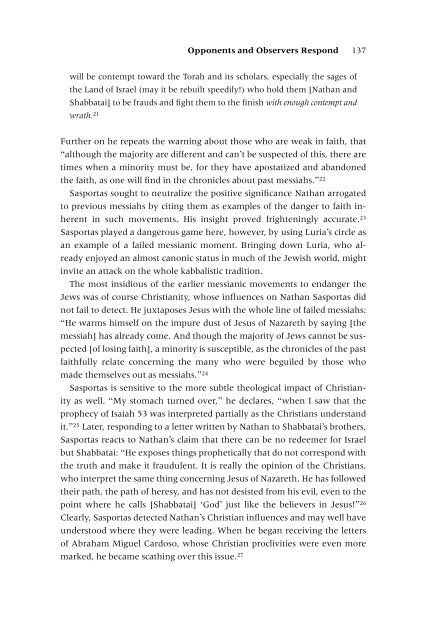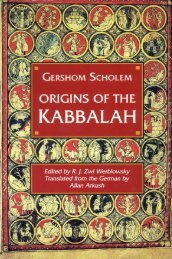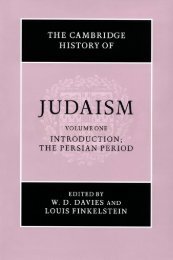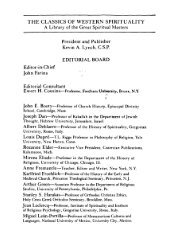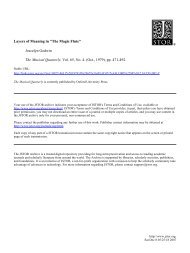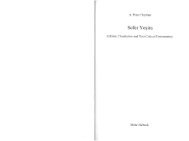You also want an ePaper? Increase the reach of your titles
YUMPU automatically turns print PDFs into web optimized ePapers that Google loves.
Opponents and Observers Respond 137<br />
will be contempt toward the Torah and its scholars, especially the sages of<br />
the Land of Israel (may it be rebuilt speedily!) who hold them [Nathan and<br />
Shabbatai] to be frauds and fight them to the finish with enough contempt and<br />
wrath. 21<br />
Further on he repeats the warning about those who are weak in faith, that<br />
“although the majority are different and can’t be suspected of this, there are<br />
times when a minority must be, for they have apostatized and abandoned<br />
the faith, as one will find in the chronicles about past messiahs.” 22<br />
Sasportas sought to neutralize the positive significance Nathan arrogated<br />
to previous messiahs by citing them as examples of the danger to faith inherent<br />
in such movements. His insight proved frighteningly accurate. 23<br />
Sasportas played a dangerous game here, however, by using Luria’s circle as<br />
an example of a failed messianic moment. Bringing down Luria, who already<br />
enjoyed an almost canonic status in much of the Jewish world, might<br />
invite an attack on the whole kabbalistic tradition.<br />
<strong>The</strong> most insidious of the earlier messianic movements to endanger the<br />
Jews was of course Christianity, whose influences on Nathan Sasportas did<br />
not fail to detect. He juxtaposes Jesus with the whole line of failed messiahs:<br />
“He warms himself on the impure dust of Jesus of Nazareth by saying [the<br />
messiah] has already come. And though the majority of Jews cannot be suspected<br />
[of losing faith], a minority is susceptible, as the chronicles of the past<br />
faithfully relate concerning the many who were beguiled by those who<br />
made themselves out as messiahs.” 24<br />
Sasportas is sensitive to the more subtle theological impact of Christianity<br />
as well. “My stomach turned over,” he declares, “when I saw that the<br />
prophecy of Isaiah 53 was interpreted partially as the Christians understand<br />
it.” 25 Later, responding to a letter written by Nathan to Shabbatai’s brothers,<br />
Sasportas reacts to Nathan’s claim that there can be no redeemer for Israel<br />
but Shabbatai: “He exposes things prophetically that do not correspond with<br />
the truth and make it fraudulent. It is really the opinion of the Christians,<br />
who interpret the same thing concerning Jesus of Nazareth. He has followed<br />
their path, the path of heresy, and has not desisted from his evil, even to the<br />
point where he calls [Shabbatai] ‘God’ just like the believers in Jesus!” 26<br />
Clearly, Sasportas detected Nathan’s Christian influences and may well have<br />
understood where they were leading. When he began receiving the letters<br />
of Abraham Miguel Cardoso, whose Christian proclivities were even more<br />
marked, he became scathing over this issue. 27


